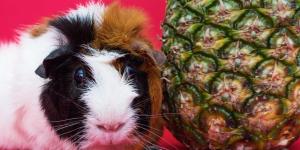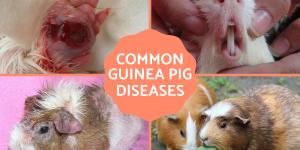My Guinea Pig Is Not Eating

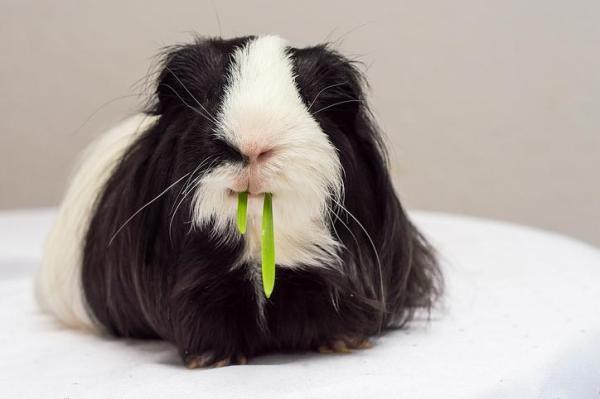
Appetite loss in guinea pigs is a sure sign there is something wrong either physically or mentally. Guinea pigs are constant grazers, meaning they will spend much of their day chewing on the abundant hay which should be provided to them. This hay is only one part of a balanced guinea pig diet, but it is a very important staple food. Problems with their diet can lead a guinea pig to stop eating. If they have their dietary needs well met, but they are not eating, it is possible a disease is resulting in their aberrant behavior. Environmental factors may also be contributing to the problem.
At AnimalWised, we find out why my guinea pig is not eating. We look at the specific causes and treatments of appetite loss in guinea pigs, but it is important to take the animal to a veterinarian if you observe this problem.
Vitamin C deficiency (scurvy)
Guinea pigs cannot synthesize vitamin C naturally, so it needs to be included in their diet. When there is not enough provided in their diet, the animal will develop a vitamin C deficiency, otherwise known as scurvy in guinea pigs. This doesn't mean we should be feeding guinea pigs with vitamin C-rich food all the time, but it does mean we need to incorporate it properly in their diet.
If the guinea pig does not receive enough vitamin C through their diet or supplementation, scurvy will develop. Vitamin C is related to the synthesis of collagen. This is a protein that is involved in the formation of bones, cartilage and connective tissue (skin, ligaments, tendons, etc.). For this reason, a lack of vitamins C can result in symptoms which affect their tissues. Some of the symptoms of scurvy in guinea pigs include:
- Dermatological problems
- Hair loss
- Weak teeth
- Anemia
- Digestive problems
- Hemorrhages (bleeding gums is characteristic)
- Weakened immune system
- Fragility of the bones
- Decreased appetite and consequent weight loss
- Lethargy and lack of movement
- Limping or imbalance when walking
- Abnormal stools
Any of these symptoms is reason for veterinary consultation. Once the symptoms have been addressed and the guinea pig is stabilized, the veterinarian will help to establish a suitable diet for your cavy. This will ensure they have the right level of vitamin C according to their specific needs.
Learn more about the importance of vitamin C in guinea pigs with our related article.
Respiratory disease
In some cases we can observe that the guinea pig is not eating or drinking due to respiratory illness such as pneumonia. When these problems become advanced, you may also be able to observe serious symptoms such as the guinea pig not moving. This could be due to the pain and/or discomfort caused by the symptoms of the disease, as well as a systemic shutdown. In case of respiratory infection we may see purulent eye and nose discharge.
Respiratory problems do not always have an infectious origin. Guinea pigs can also suffer from tumors, such as adenocarcinoma, which are detected on x-rays or ultrasounds. They produce symptoms similar to those of pneumonia. This type of tumor is relatively common in guinea pigs over three years of age. This emphasizes the importance of going to a veterinarian specialized in exotic animals to achieve a differential diagnosis.
Based on the test results, the veterinarian will establish the appropriate treatment. Since the guinea pig may not eat or drink when they feel uncomfortable, it is very important to keep them hydrated. We can give them more appetizing food for a short time and ensure they always have water within reach.
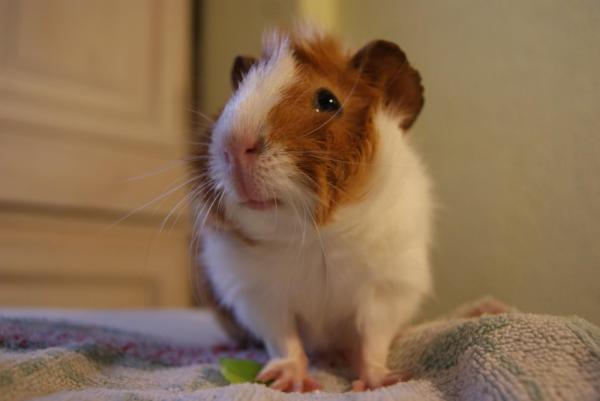
Digestive problems
Gastrointestinal disorders can result in various symptoms, but a guinea pig not eating or drinking is one of the most common. This is often due to the digestive upset which makes eating more difficult. Although not always the case, it is also often a result of improper diet. Not offering the food that our guinea pig needs can cause digestive discomfort that manifests itself in problems such as excess gas or constipation.
Another important function of hay for guinea pigs is the regulation of intestinal transit. Hay provides a lot of the cavy's roughage, i.e. dietary fiber. Without it, the guinea pig can become constipated. This can further develop into gastrointestinal obstruction, something that can be fatal in guinea pigs if not resolved. In addition to not eating or drinking, we may see the guinea pig has an inflamed abdomen. This is known as bloat.
Parasitical infestations can also result in appetite loss in guinea pigs. Intestinal parasites can cause various symptoms including diarrhea and lethargy. The digestive upset can lead the animal to stop eating, something which is life threatening. It is also possible the guinea pig has ingested something inappropriate, resulting in a foreign body in their GI tract.
The vet will examine the animal through palpation and may use imaging tests such as x-rays. They will then determine the correct course of action. In the case of gastrointestinal blockage, surgical intervention may be required.
It is possible your guinea pig will still eat when they have gastrointestinal problems. In these cases, we may see the guinea pig has diarrhea or other symptoms, but they have not lost their appetite. This will also require veterinayr consultation.
Dental problems
Another important issue to consider is the dental health of the guinea pig. Like rabbits and hamsters, guinea pigs have teeth which grow continuously throughout their lives. For this reason, it is very important they are able to wear them down, otherwise they will grow inappropriately. This can lead to something known as malocclusion. This is when the teeth become misaligned and can impede their ability to eat.
In addition to the guinea pig not eating or drinking, they can be in very serious pain. It is even possible for the teeth to grow through their mouth tissue. This will only occur in serious cases of neglect. Providing the guinea pig with a constant supply of hay helps to grind down the teeth and prevent malocclusion. However, some guinea pigs may need additional help in the form of teethers or other objects on which they can gnaw.
Other dental problems can occur if the guinea pig has an improper diet. While fruit can be incorporated into their diet, it should be in limited quantities. Too much sugar can increase dental plaque and tartar which can cause tooth loss and other problems.
If dental problems occur, you will need to take the guinea pig to a veterinary specialist. The solution usually involves filing the teeth. This can be a difficult and delicate process, so it should be carried out by a professional. If a secondary infection has occurred, antibiotic treatment will be required. Analgesics may also be administered to mitigate the pain.
If no complications arise, the guinea pig should be back to eating as soon as the teeth are fixed. We will need to speak about diet and other dental care to best prevent a malocclusion occurring again in the future.
Environmental factors
In addition to the physical aspects that we have explained in the previous sections, we can find guinea pigs that do not eat or drink or move for reasons such as stress or depression. These animals are very sensitive to changes in their environment. These changes can include:
- Dietary changes
- New family members
- Change in housing
- Too much noise
- Not providing enough exercise
- Over-handling
Such changes can affect the sensitive guinea pig to the point of losing their appetite and changing their mood. When a guinea pig loses their appetite, it is very important we look at the context of this behavior. If it occurs after making significant changes, we will need to help them through the change. This requires providing more security and reassurance.
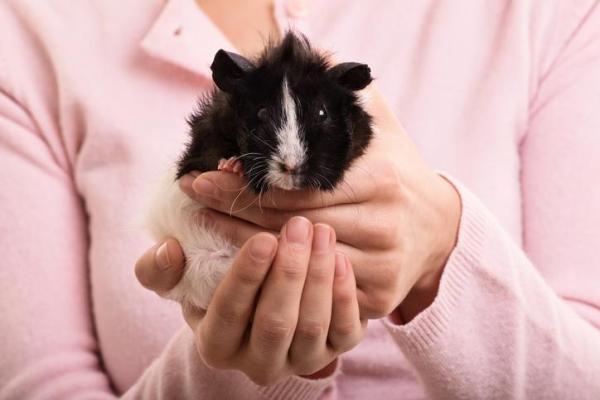
The importance of guinea pig diet
Throughout the previous sections we have seen the importance of paying attention to a guinea pig's diet. Changes and problems to this diet are one of the most common reasons they stop eating or drinking. Portion control is also very important in considering what a guinea pig eats. Eating too much of the wrong thing or too little of the right thing can be equally harmful.
If our guinea pig is dehydrated, we may need to help them drink with an oral syringe. We can place the nozzle of the syringe at the side of the guinea pig's mouth and slowly put pressure on the plunger. This way, we can introduce water slowly. This is especially helpful in guinea pigs with dental problems. We can also feed them by providing a suitable porridge to give them emergency nutrition.
This type of feeding is not sustainable. We will need to take the guinea pig to a veterinarian if they are unable to eat or drink. They will diagnose the underlying cause and administer the correct treatment. Once the treatment is successful, they will need to ensure the guinea pig's specific dietary needs are met. Guinea pigs are exclusively herbivorous animals and require the following diet:
- Between 75 and 80% hay which needs to be provided continuously.
- 20% feed which is specifically formulated for guinea pigs
- From 5 to 15% vegetables, it is very important that they are rich in vitamin C (such as spinach, cabbage or parsley)
- Occasional consumption (only as a reward) of fruits and cereals. They should not be given daily.
- Vitamin C (ascorbic acid) supplement at the dose recommended by the veterinarian.
This would be a model diet for adult guinea pigs. In guinea pigs under six months old or pregnant females, it should be adjusted, since nutritional needs change.
There are certain fruits and vegetables which are recommended for guinea pigs, but they will need to be eaten according to the above guidelines. Some foods are forbidden for guinea pigs and need to be avoided altogether. If the veterinarian has determine your guinea pig has a health issue which requires certain changes to this standard guinea pig diet, they will provide the specific information to do so.
Learn about what these health problems in cavies may be with our guide to the most common diseases in guinea pigs.

This article is purely informative. AnimalWised does not have the authority to prescribe any veterinary treatment or create a diagnosis. We invite you to take your pet to the veterinarian if they are suffering from any condition or pain.
If you want to read similar articles to My Guinea Pig Is Not Eating, we recommend you visit our Other health problems category.

